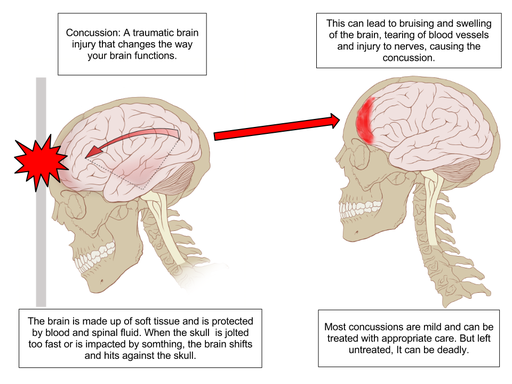CTE stands for Chronic Traumatic Encephalopathy, a type of dementia that can result from multiple concussions or lighter hits to the head over time. In 2013, a $765 million payout by the NFL over CTE dementia, CTE-type of dementia made front page headlines. It became a matter of concern for millions of people engaged in concussion-prone activities as obvious as football or boxing, to ones as subtle as biking and soccer, all which carry the risk of multiple hits to the head over the course of a lifetime.
300,000 Concussions per Year
Across America, according to latest reports, nearly 300,000 high school athletes sustain concussions each year. Properly identifying, evaluating, and treating those student athletes is critical to returning them to the game safely.Darren S. Lovick, M.D., Saint Luke's Neuroscience Institute surgical director and neurosurgeon, recommends a graduated stepwise approach to getting an injured athlete safely back on the field.
Critical to Identify & Evaluate Concussions
"Over the years we have gradually witnessed an increase in the number of concussions among high school athletes," said Lovick. "It is critical to not only quickly identify and evaluate the severity of the brain injury but to also use caution when determining when that athlete is ready to get back in the game."A concussion is a traumatic injury to the brain typically caused by a blow to the head. Symptoms can include headache, vomiting, blurred vision, brain fog, fatigue, mental confusion, difficulty sleeping, and in the most serious instances, loss of consciousness.
Concussions can range from mild, moderate, and severe and can be evaluated through a variety of tools including a neurological exam, a head CT, or an MRI.
Once a patient has been evaluated and treated and is asymptomatic, Lovick advocates a graduated stepwise return to play.
Steps to Concussion Management
- No activity
- Aerobic activity – walking/jogging/running
- "No Contact" sport specific drills
- "Light Contact" sport specific drills
- "Full Contact" practice
- Return to play
"Obviously the safety and well-being of the student is everyone's top priority," said Lovick. "Educating parents, coaches, and the athletes themselves, so the player only returns to play once he or she is physically ready, is essential."

A concussion is traumatic brain injury that changes the way your brain functions. When the skull is jolted or impacted by a hard surface, the brain shifts, slamming against the skull, causing damage and swelling to the brain. If treated correctly, brain will heal. But if not, results can be deadly.
TREATMENT / EVALUATION:
- To help ensure the health and safety of young athletes, the U.S. CDC developed the HEADS UP Concussion in Youth Sports initiative to offer information about concussions to coaches, parents, and athletes involved in youth sports. The HEADS UP initiative provides important information on preventing, recognizing, and responding to a concussion.
- For more information about proper concussion evaluation and treatment visit the Center's for Disease Control and Prevention "Heads Up" website at http://www.cdc.gov/concussion/HeadsUp/youth.html.
- Saint Luke's Neuroscience Institute, a member of Saint Luke's Health System, is a global leader in neurological treatment and care.

Researchers could study ACETYL L CARNITINE(ALCAR)as SUPPORT THERAPY in Repeated Concussion (RC) and in Chronic Traumatic Encephalopathy.The main neurons disorders that leads to neurodegeneration(CTE),are the biochemical,molecular,metabolical and brain energy disorders,that leads to tau hyperfosforilation and tau accumulation(1),(2),(3),(4).As we can read in the reference articles bellow,in animal models,small doses of fifty miligrams by day/rat , per os,the nutraceutical supplement ACETYL L CARNITINE (ALCAR),a constituent of the inner mitochondrial membrane,looks to gives neuroprotection in Traumatic Brain Injuries,TBI(4)and in ischemic brain injuries,as strokes(5),mainly when started in the firsts 3 to 24 hours afters such brain injuries,and ALCAR enhances memory retention,LOWERS TAU PHOSPHORYLATION AND ACCUMULATION(6),(7),(8),(9)and LOWERS BETAMYLOID ACCUMULATION(7).ALCAR looks to fits for research as support therapy(and maybe to prevent?)the taupathies related to Repeated Concussion and to the Chronic Traumatic Encephalopathy.
ReplyDelete